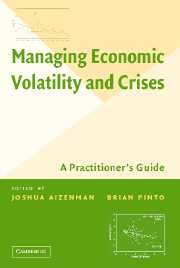Book contents
- Frontmatter
- Contents
- Contributors
- Acknowledgments
- Foreword
- MANAGING ECONOMIC VOLATILITY AND CRISES
- Overview
- PART I WHAT IS VOLATILITY AND WHY DOES IT MATTER?
- PART II COMMODITY PRICES AND VOLATILITY
- 4 Agricultural Commodity Price Volatility
- 5 Managing Oil Booms and Busts in Developing Countries
- PART III FINANCE AND VOLATILITY
- PART IV MANAGING CRISES
- Technical Appendix
- Index
- References
5 - Managing Oil Booms and Busts in Developing Countries
Published online by Cambridge University Press: 25 July 2009
- Frontmatter
- Contents
- Contributors
- Acknowledgments
- Foreword
- MANAGING ECONOMIC VOLATILITY AND CRISES
- Overview
- PART I WHAT IS VOLATILITY AND WHY DOES IT MATTER?
- PART II COMMODITY PRICES AND VOLATILITY
- 4 Agricultural Commodity Price Volatility
- 5 Managing Oil Booms and Busts in Developing Countries
- PART III FINANCE AND VOLATILITY
- PART IV MANAGING CRISES
- Technical Appendix
- Index
- References
Summary
ABSTRACT: The poor economic performance of oil-rich countries has led to the notion that oil abundance, ideally a blessing, is frequently a “resource curse” which stunts instead of spurring economic growth. Explanations for this phenomenon can be divided into two categories. The first emphasizes governance issues (including rent-seeking and corruption); the second emphasizes the economic effects, often called “the Dutch Disease.” This study examines the latter set of issues in oil-exporting developing economies, with an emphasis on the role of fiscal policy. It surveys policies and institutional mechanisms designed to minimize the harmful effects of oil booms and busts through government expenditure management, self-insurance, and asset diversification.
RESOURCE ABUNDANCE: THE PARADOX OF PLENTY?
The weak economic performance and continued poverty of many commodity-dependent economies, particularly oil-exporting ones, continues to pose a challenge to development economists. That resource-poor countries have outperformed resource-rich countries in terms of economic growth has been well documented (see Ranis 1991; Sachs and Warner 1995; Auty 2001).
The explanations for poor growth performance on the part of oil-exporting countries can be roughly divided into two categories. Some focus on governance issues such as corruption, rent-seeking, and bloated public sectors (Karl 1997; Eifert, Gelb, and Tallroth 2003). Others focus on the economic effects: namely, the Dutch Disease and volatility (Gelb and Associates 1988; Corden and Neary 1982; Aizenmann and Marion 1993; Gavin 1997; Hausmann and Rigobon 2003). This study focuses on the latter set of issues.
- Type
- Chapter
- Information
- Managing Economic Volatility and CrisesA Practitioner's Guide, pp. 186 - 212Publisher: Cambridge University PressPrint publication year: 2005
References
- 15
- Cited by

